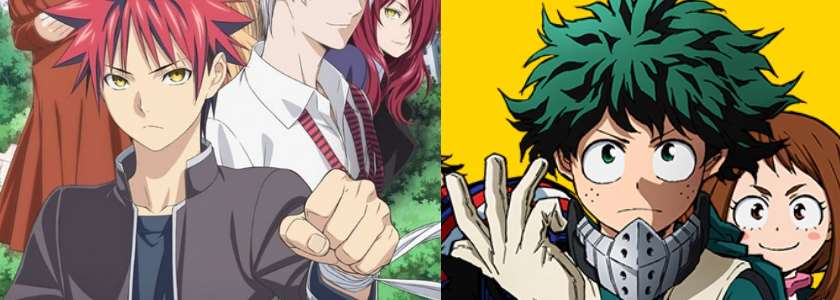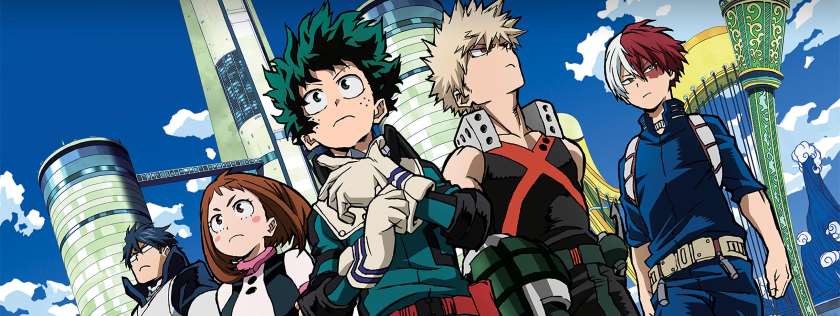My Shounen Food Academia

I’ve been quite open about my exhaustion with Western television in this column and on this website. Police and medical procedurals are so commonplace because you can craft a brand new crime, injury, or illness of the week while tossing in a good mixture of interpersonal human drama. Often there will be a twist, such as House M.D. and its cantankerous, grumpy protagonist. However, these shows are not developed with a sense of where they’re going, but an easily repeated formula with a key ingredient to give it some zip.
When the creators of Aqua Teen Hunger Force were tasked with creating a pilot episode, they were told that there needed to be a general structure or template that would “give viewers a reason to tune in each week”. So the first episode creates this illusion that they’re a crime-fighting trio that goes to stop whatever chaos the mad scientist has wrought in the opening prologue of the episode. However, this is all part of “the joke” for the creators, because that was never the show’s intent. Each episode is effectively written off-the-cuff and without any sense of direction. If Seinfeld was a show about nothing, then Aqua Teen Hunger Force is a show without purpose. Its pilot episode and opening animation are a complete joke regarding the network’s expectations of a silly, late-night comedy cartoon.
If I were to sit down and simply want something simple and reliable to fill the time, I’d likely have no issue with these sorts of shows. However, even when I’m exhausted I prefer my television have something to offer. I suppose my desire of entertainment is for it to revitalize me. While shows that rely on a formula can work well enough as an occasional comfort food, I’d rather my time be spent with something that “accomplishes something”.
Which is why shows like My Hero Academia and Food Wars! are simultaneously so delightful and so frustrating. Both of them rely on what has become the “shounen fighting formula”. Despite being an underdog, the protagonist has some unique strength exclusive to them that allows them to succeed where others might fail. One after the next they are met with stronger and more accomplished opponents, forcing them to rethink past tactics and strategies and somehow overcome their vulnerabilities.
Now, sometimes the protagonists encounter failure. When I discussed the first arc of Bleach I mentioned protagonist Ichigo being utterly, thoroughly defeated. Yet through the miraculous powers of Deus Ex Machina, we find that Ichigo not only survived, but is capable of recovering his Soul Reaper capabilities. Powers that his antagonist at the time supposedly severed.
In a desperate attempt to give the story a sense of drama, the writer shoves their hero into a corner. Incapable of writing themselves out of the pit, the author seeks the clouds for a convenience to pluck, cobbling together an excuse for the hero to keep going despite a drastic outcome.
Neither My Hero Academia or Food Wars! are strangers to this sort of writing. By all accounts protagonist Midoriya from Academia should have irreparably wrecked his forearm about two or three times since Recovery Girl insisted any further reckless behavior would permanently break it.

However, both shows in their third seasons have managed to work around these issues in some fashion. With Midoriya, it has become a focus on fighting with his legs rather than his fists. For Food Wars! it is in pulling the primary focus away from Yukihira and instead placing Erina at the story’s emotional core. Yukihira is still the protagonist, but the narrative isn’t really about him. It’s about the more interesting, more conflicted Erina Nakiri.
This is the advantage I would give shounen fighting anime over Western television. Even though both are long-lasting forms of television, even the best shounen fighting anime have a sense of a destination. You’re not simply being dragged along for the latest fight of the week. There’s a desired conclusion to all of it.
Keep in mind I specified best shounen fighting anime. More often than not, whatever fascinating finish the show has applied at the start to stand out begins to wear off, revealing nothing but the same repetitive, tired tropes running underneath. It becomes as tired as the crime and hospital dramas of Western television.
Which is why keeping up with shows like Food Wars! and My Hero Academia always keep me on edge. Once they find their formula they begin to feel tired and repetitive. Are they truly going somewhere? Am I the only one exhausted by seeing yet another show throw this sort of fight at me? I look online only to see people tweeting about “all the feels” of a major story moment I had already seen occur in DragonBall Z before it, and know happened in Naruto.
Both Food Wars! and My Hero Academia reached their third seasons this year, and my attitude towards both was that this would make or break my long-term investment. With Food Wars!, I would say I was overall more entertained because of how they shook things up. Even if the villain is as over-the-top and corny as you could imagine for such a show, what that villain represents not to the protagonist, but to Erina, is what gives the show heart. All of a sudden I’m not watching to see which impossible-to-cook-at-home recipe beats the other. I’m not captivated by the self-aware titillation and comedy. I’m watching because I want to see Erina break free of her past and her father’s legacy.
I already know Yukihira will, in some way, succeed. However, his success now has a new dimension as it factors into Erina’s own emotional journey, and that recontextualizes the entire show. I’m still biting my nails, waiting for the show to inevitably disappoint, but if they can pull off this story arc in a satisfying manner – and, perhaps, actually end the show at a reasonable stopping point – then I’d be more than satisfied. I would eagerly go back and rewatch it all with the new context, seeing how Yukihira and Erina’s journeys gradually come together.

My Hero Academia, however, has done a better job of building Midoriya into his current arc. Unlike other shounen protagonists, he’s not naturally good at fighting. What sets him apart is his heart and the humility of having struggled to achieve an impossible dream. So the entirety of the show has been about Midoriya learning how to control his power, which has now evolved into developing his own unique fighting style rather than imitating another. Something his rival Bakugo has naturally been good at from the very first day. It’s what, perhaps, makes the two characters and their inevitable stand off this season interesting. Bakugo has always been a better fighter than Midoriya, but Bakugo lacks the same heart and compassion that made Midoriya the worthy successor to All Might’s power.
However, it has taken so long to get to this point, and largely because My Hero Academia has more thoroughly established a formula for itself than Food Wars! has. The students will always have a “regular” hero school activity that will then be followed by a sudden serious “invasion” from the villains. Neither of these story templates carries with it much drama as none of the students fail, suffer dream-shattering injury, or at the most extreme, die. Any character that does suffer such trauma is largely the equivalent of a Red Shirt in an old episode of Star Trek. A half-hearted attempt to set the stakes despite the foreknowledge our heroes will all make it out alive.
Food Wars! is similarly guilty of this, but they at least had the audacity to fail out the majority of our characters. Sure, they’ll all inevitably get back into the school once Yukihira and company win the day, but for now they are unable to truly help our protagonists. Both shows have proven themselves unreliable when it comes to the “incredibly aggressive” failure rate of each school. These characters are the chosen one percent, and as such we know they’ll come out alright in the end. Even those who “fail” suffer little more than slaps on the wrist.
For now, I shall continue to watch both shows, but the only thing that sets them apart from most long-running Western television – aside from having the audacity to be about something other than crime or hospitals – is the sense of going somewhere. Time will tell if they fall into the same trope-heavy funks most other shounen before them have fallen into, or if they can somehow shake things up just enough to keep me invested.


